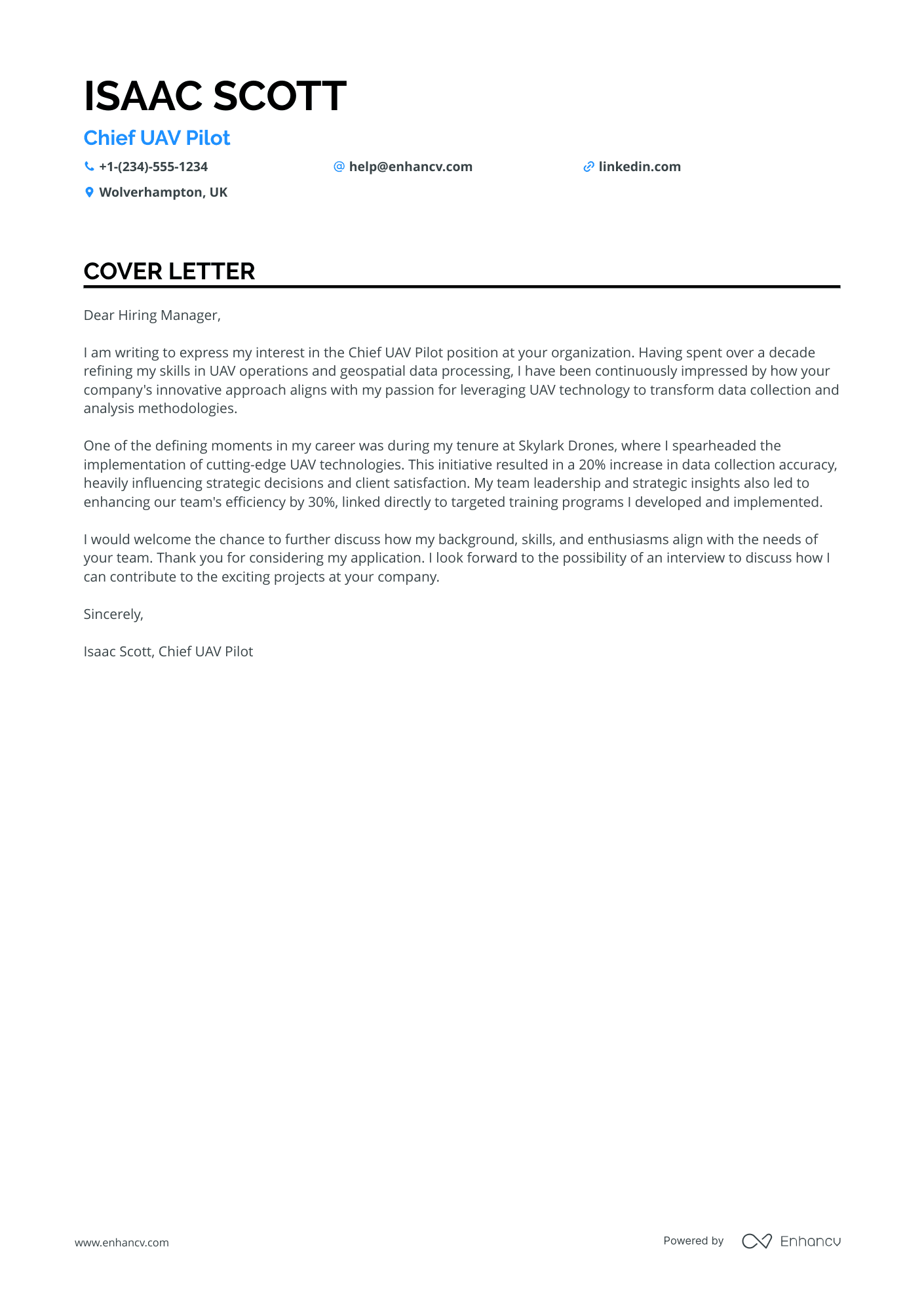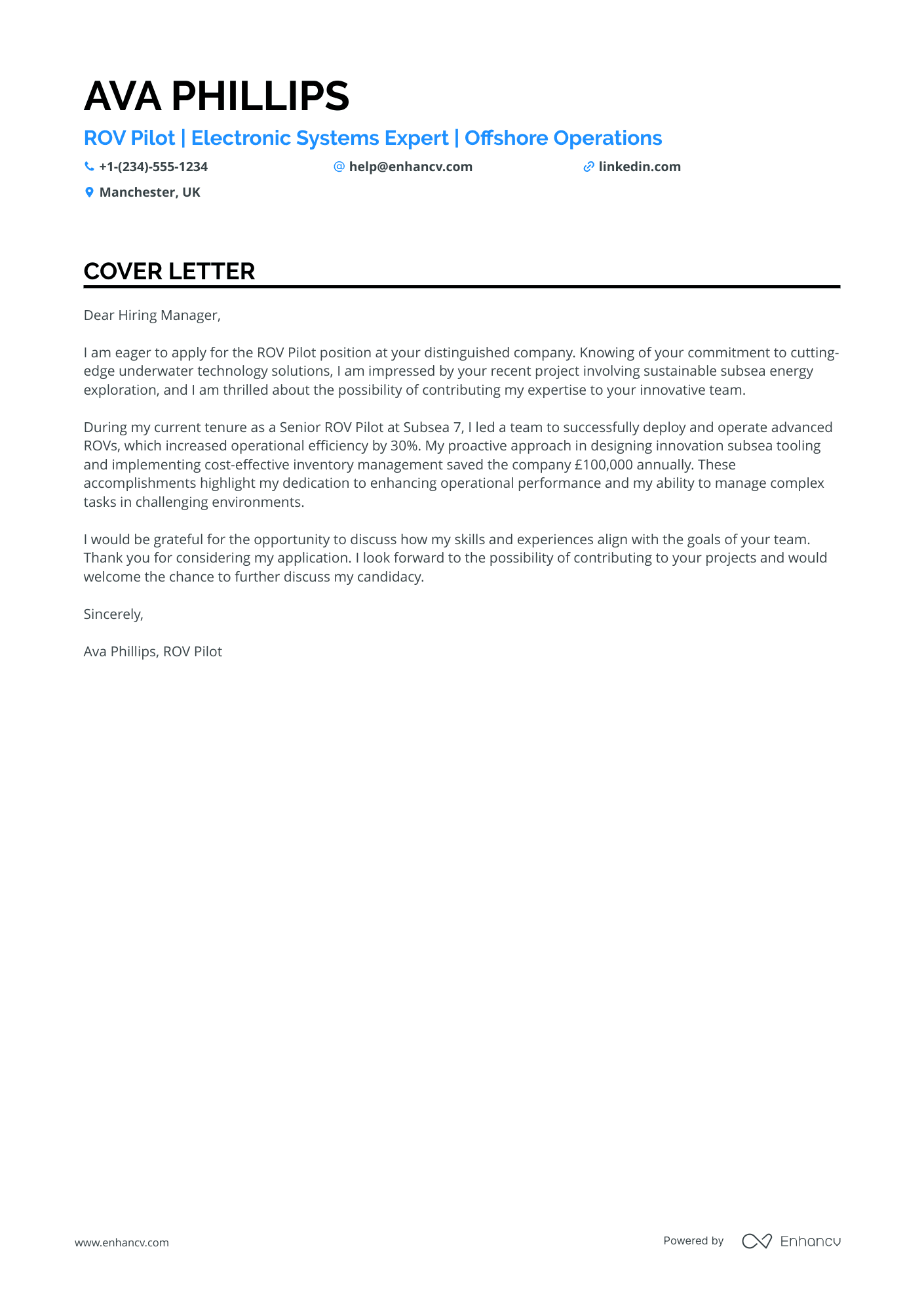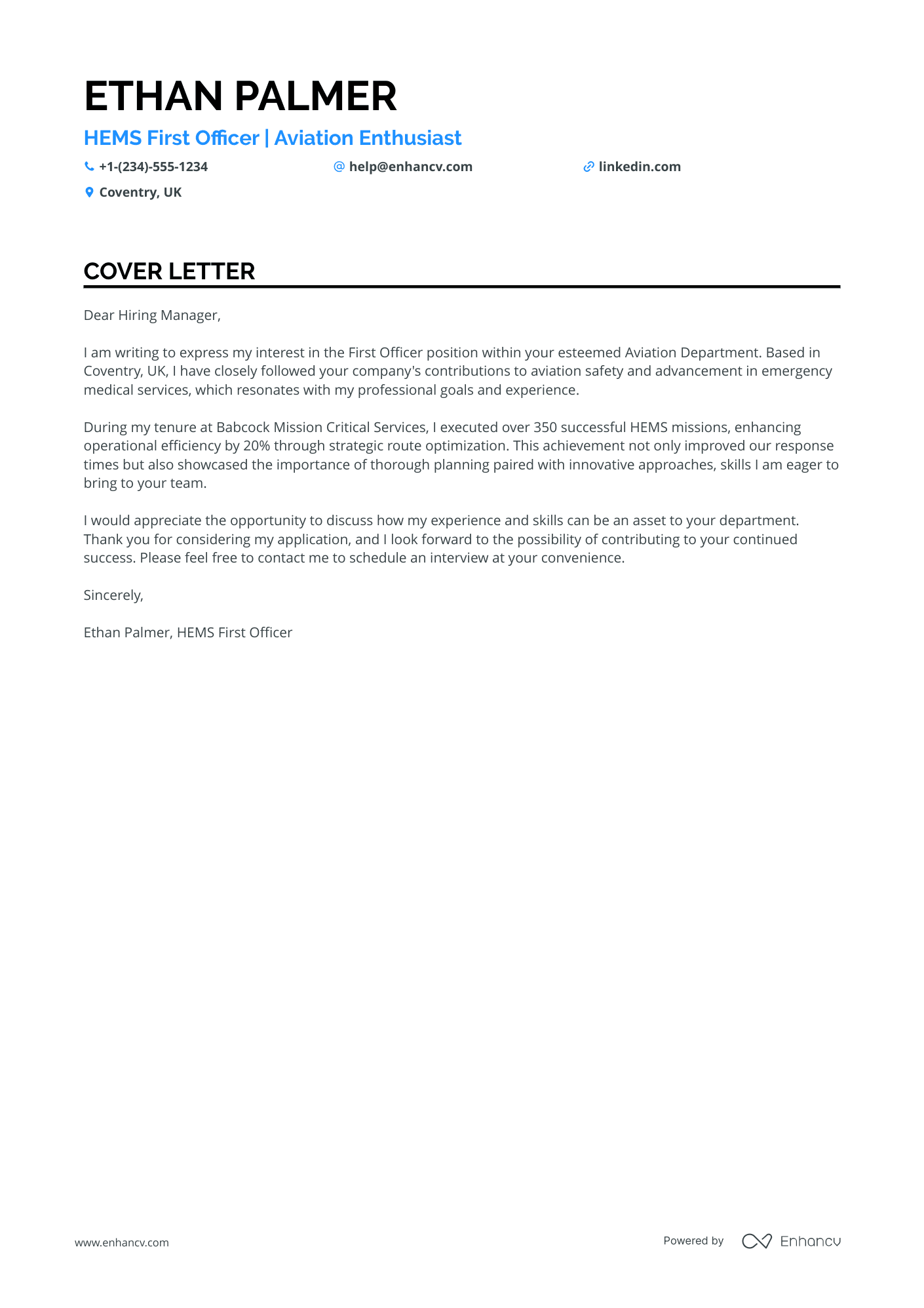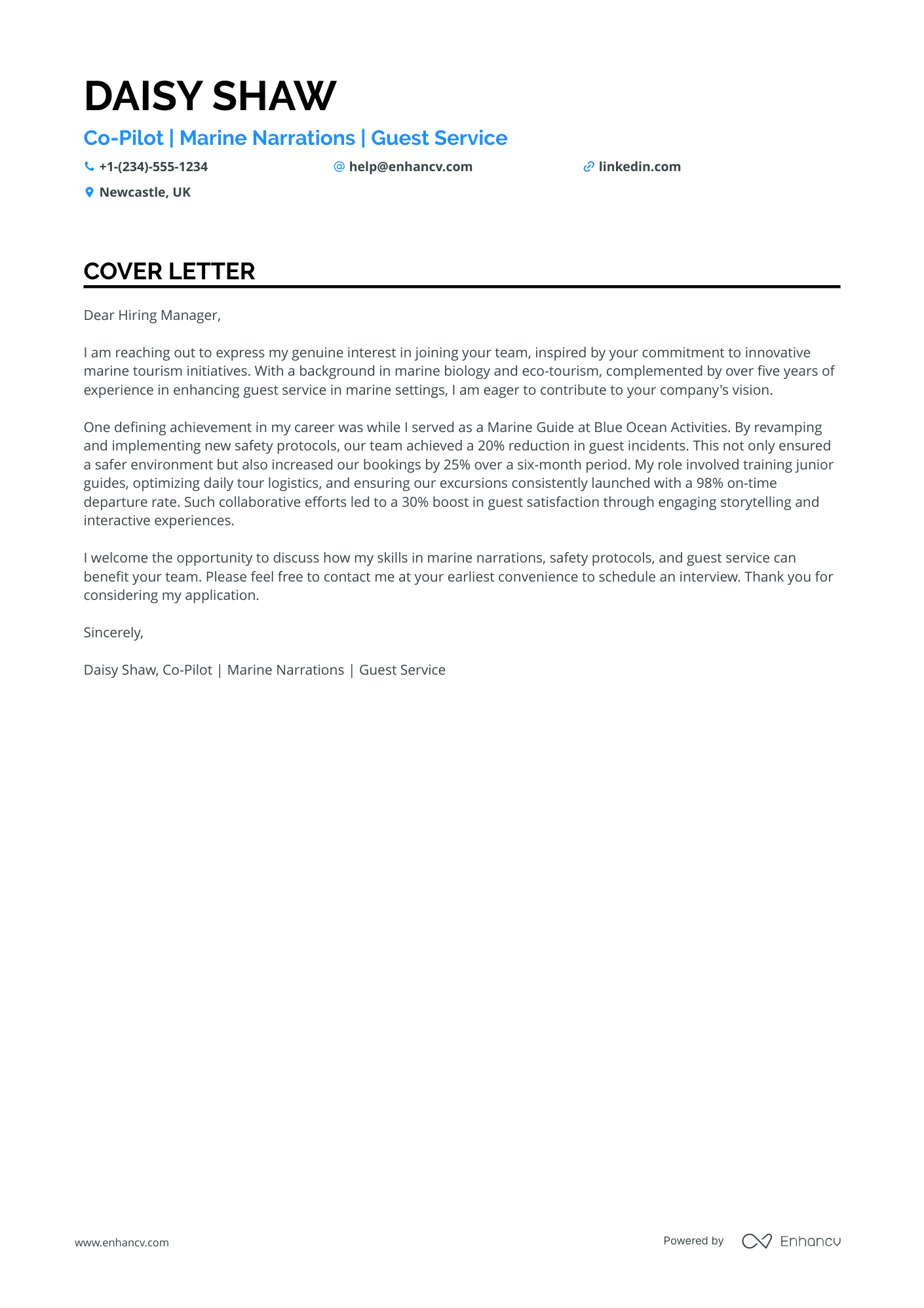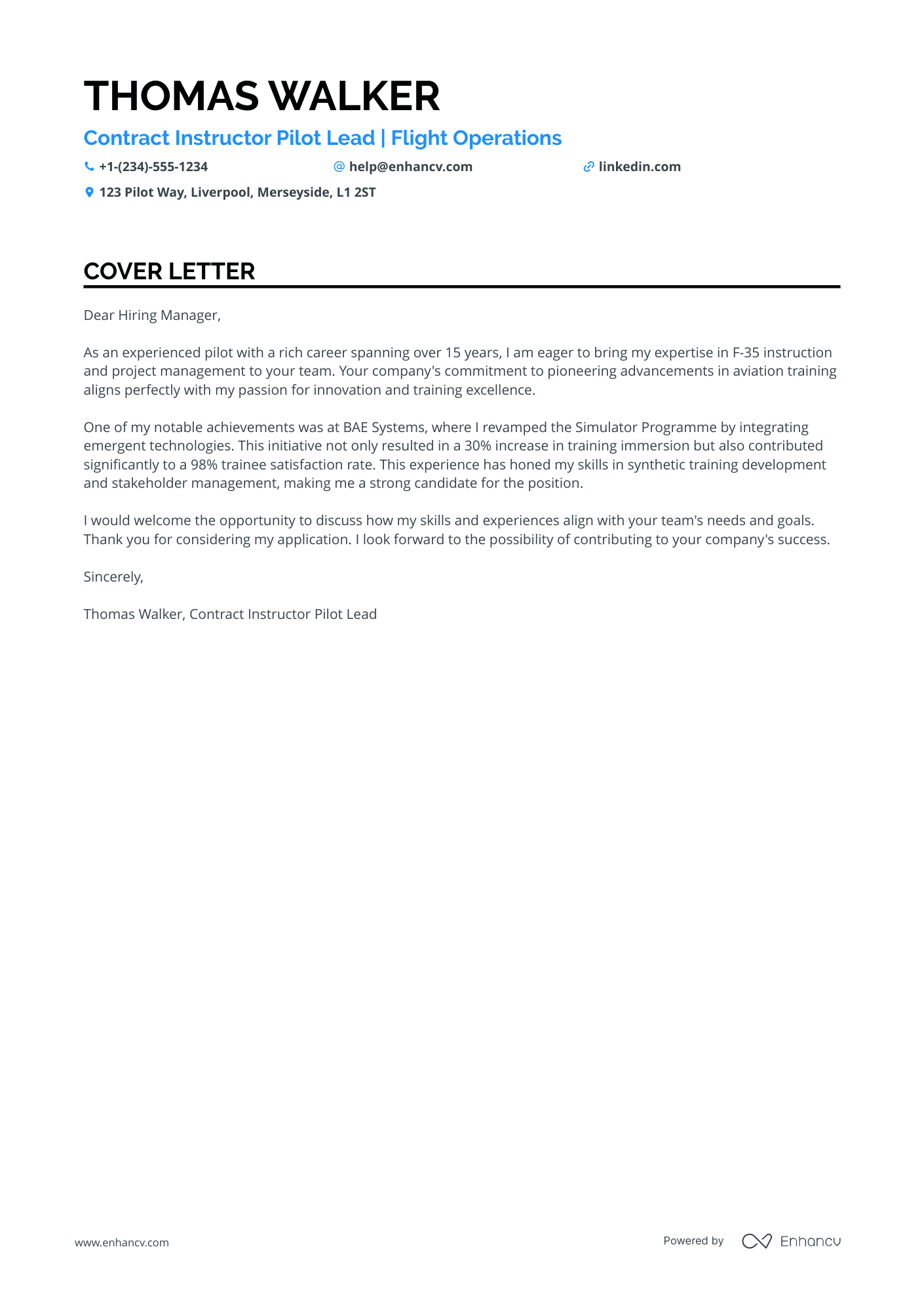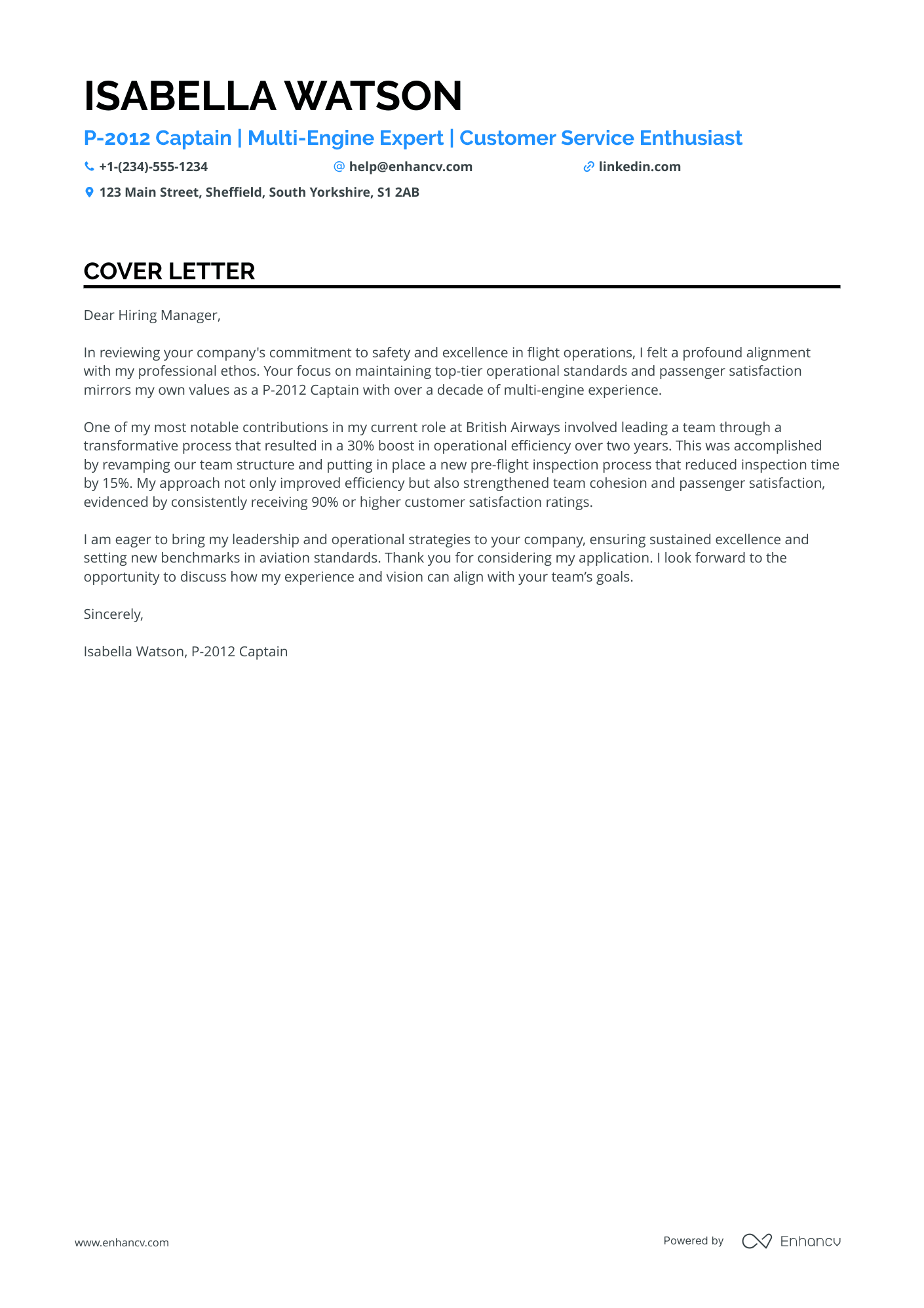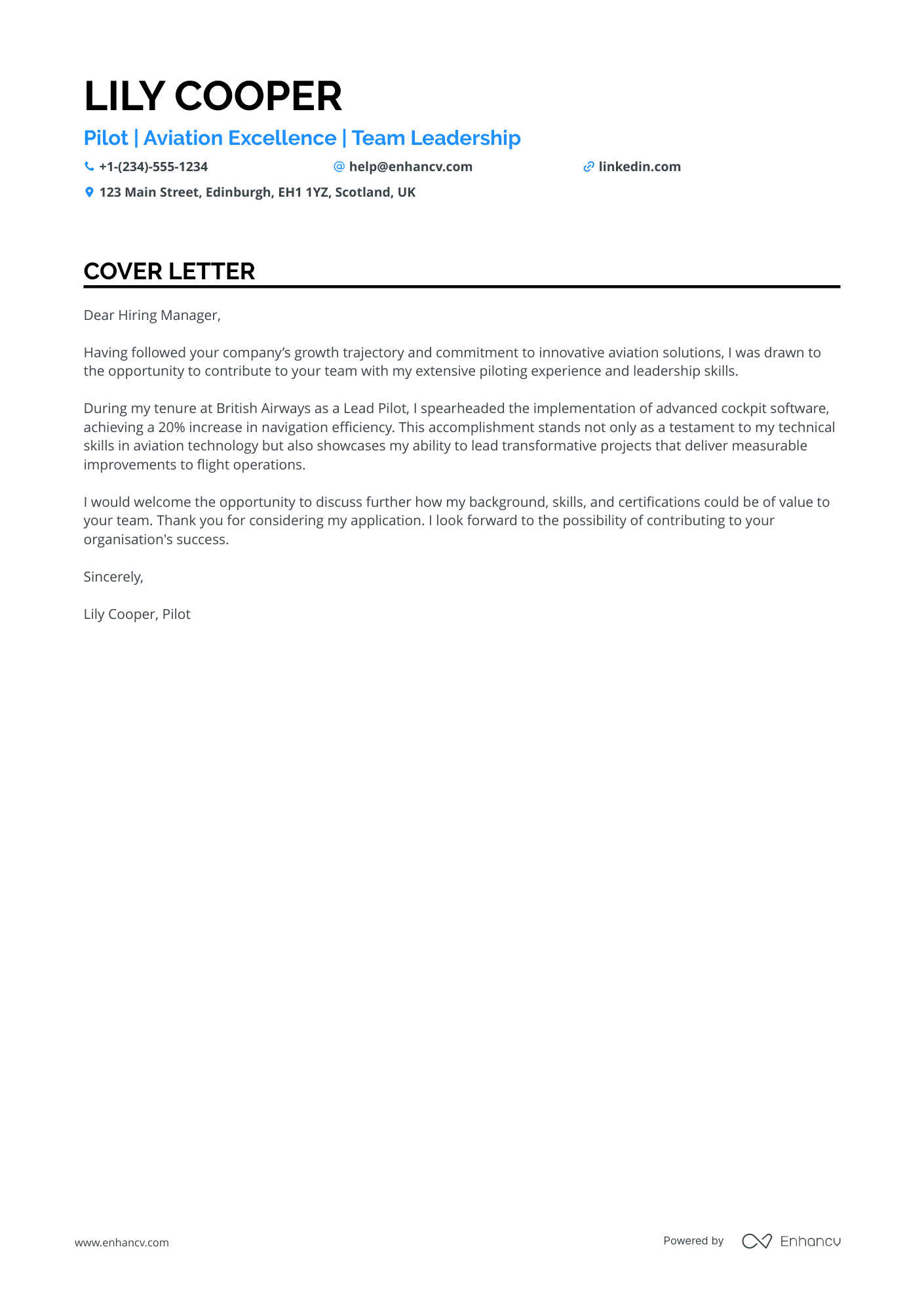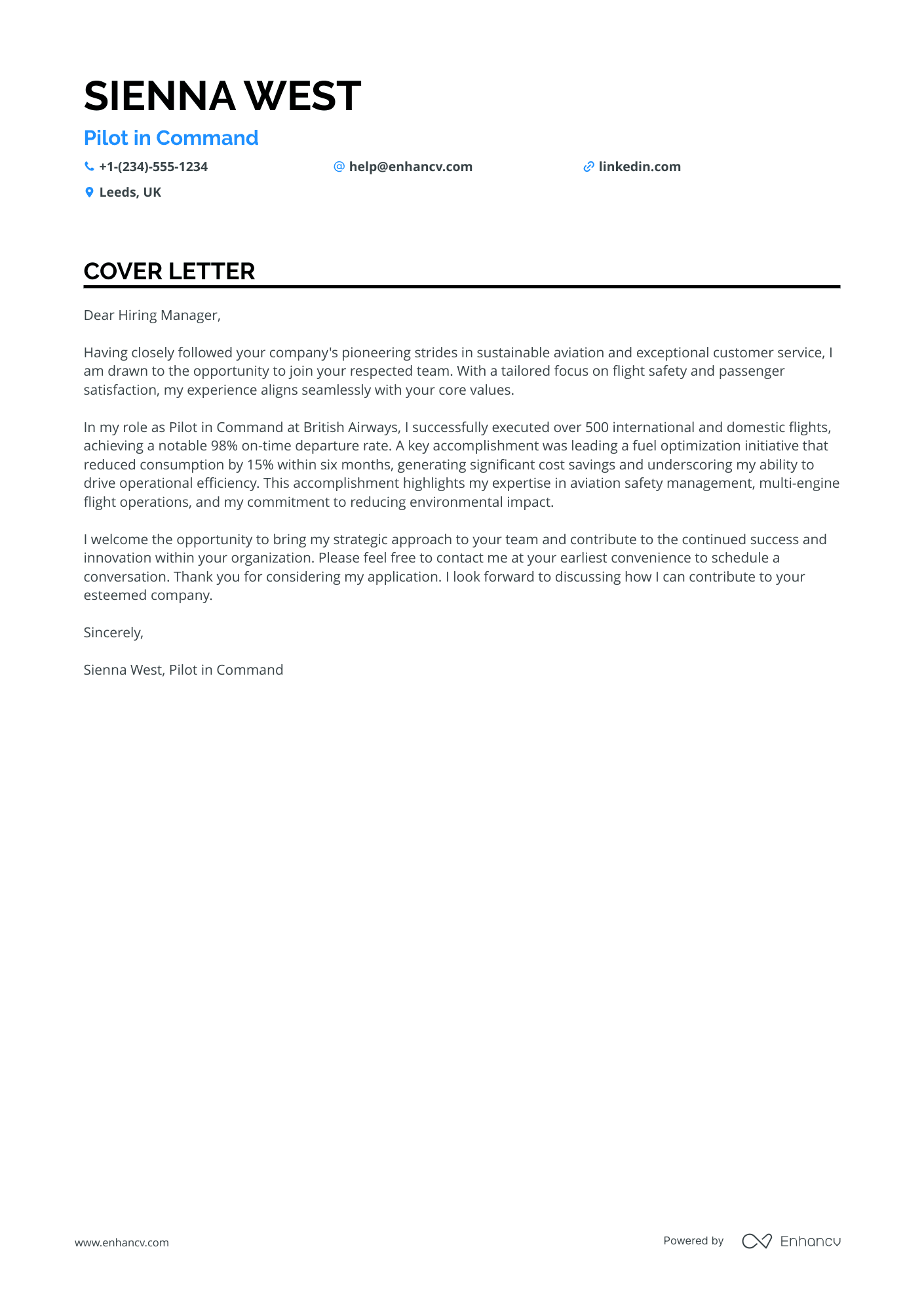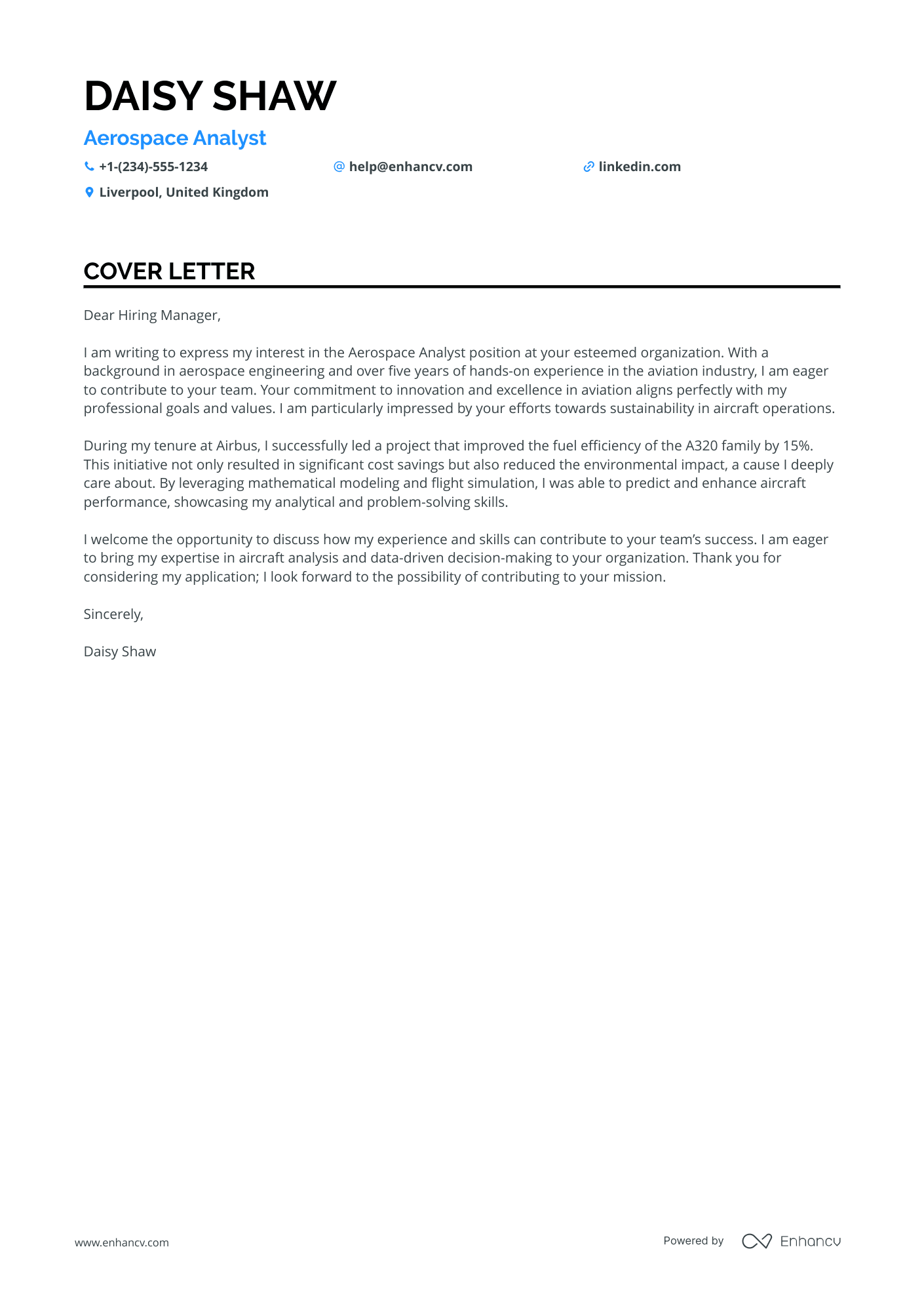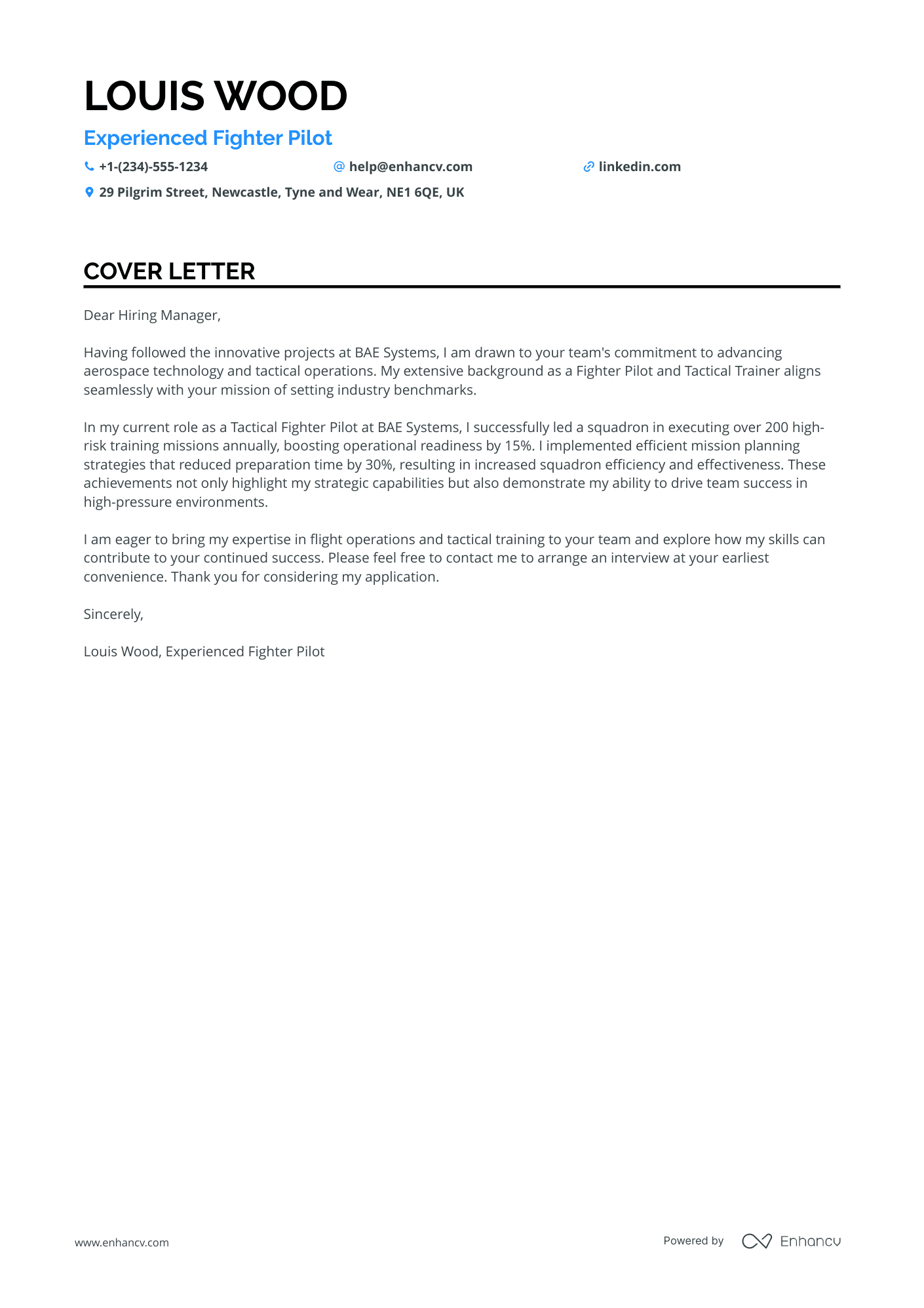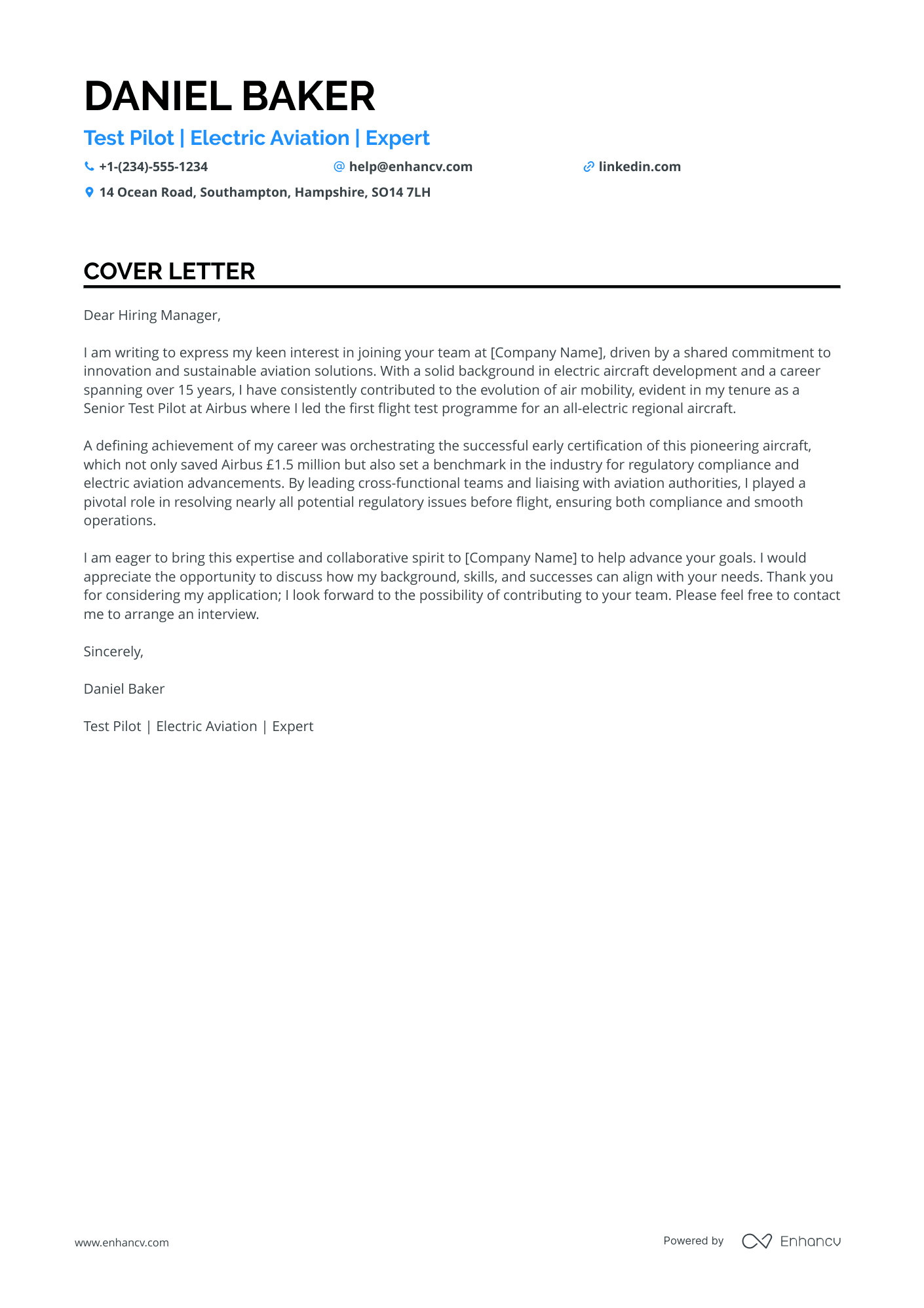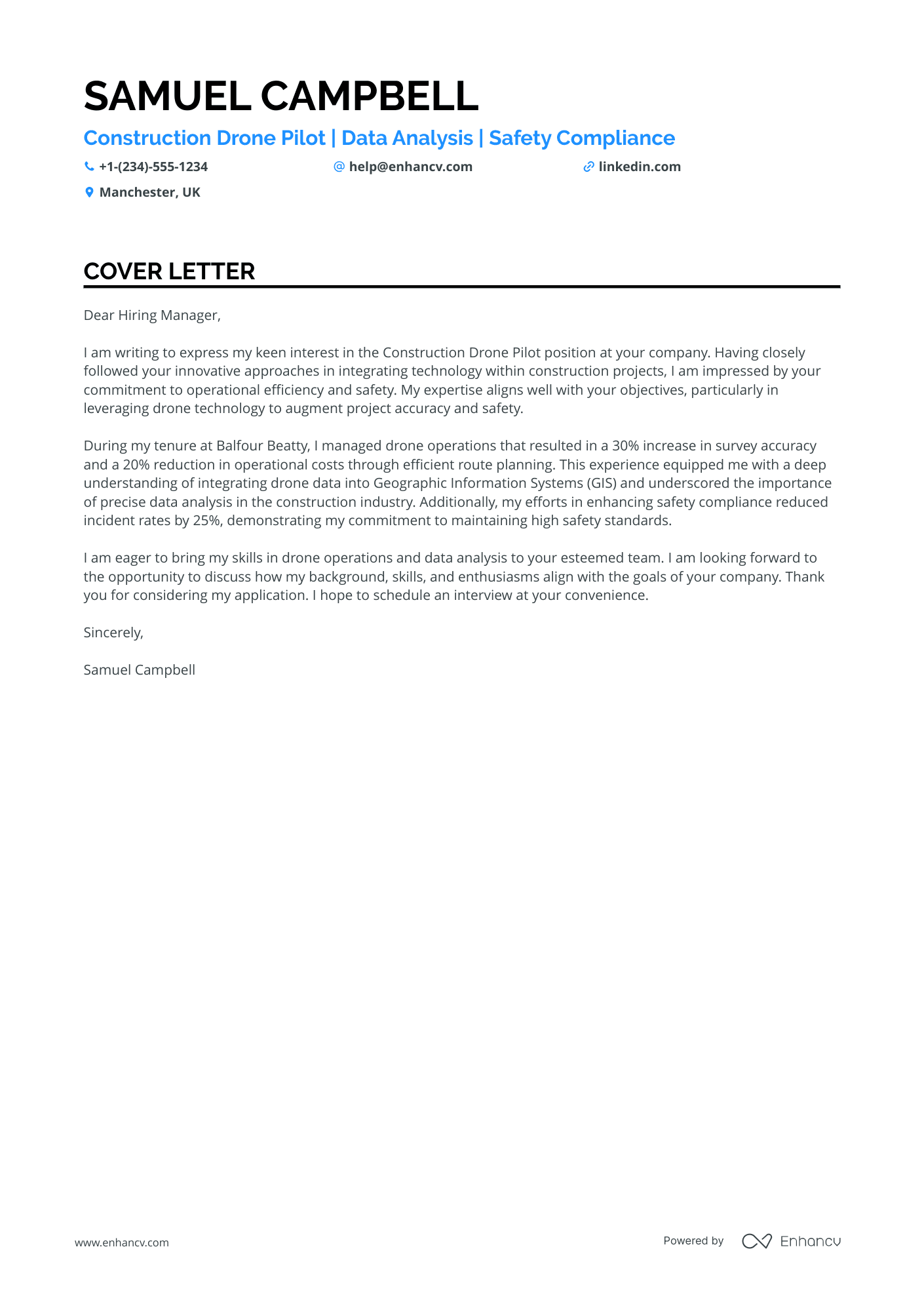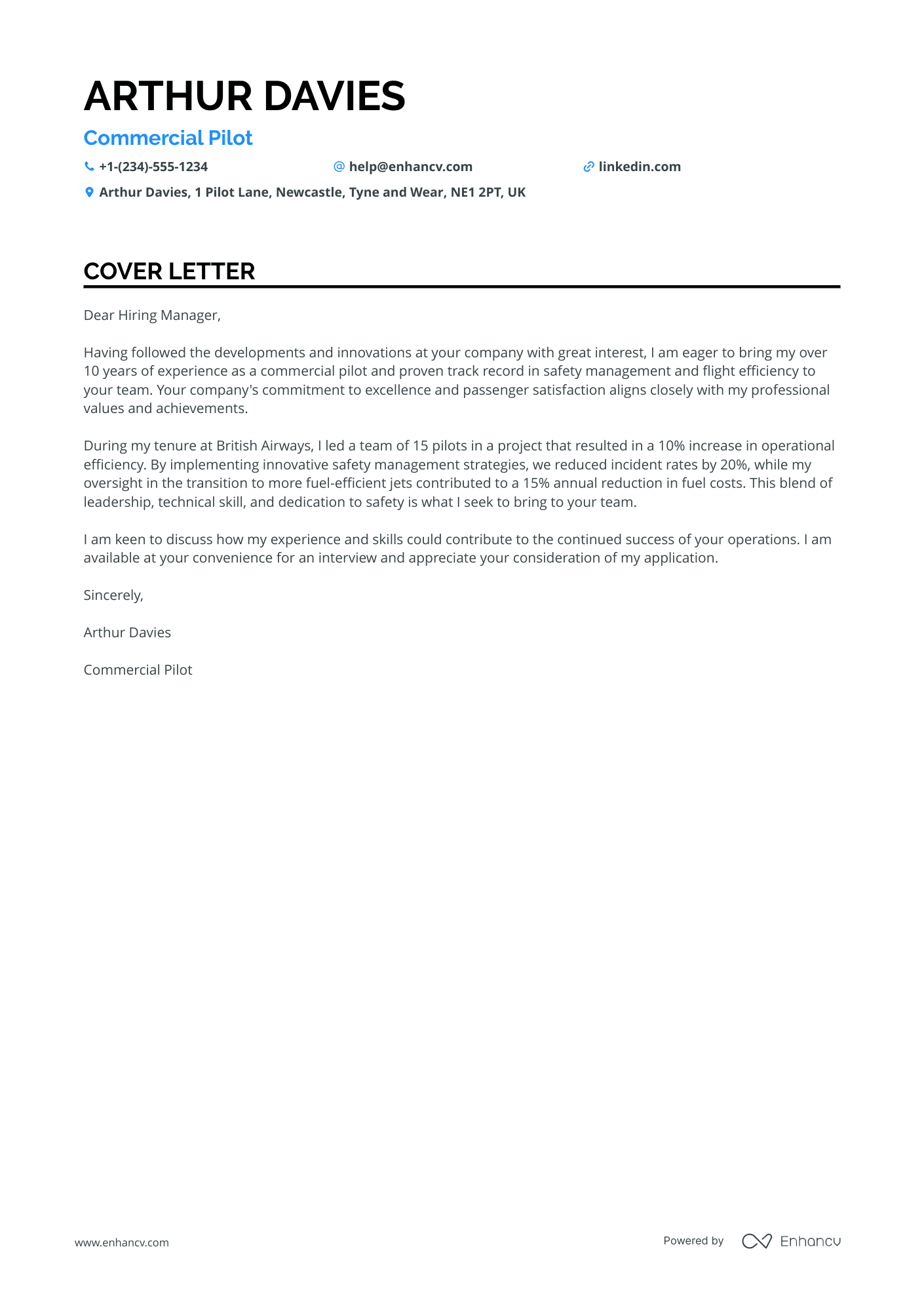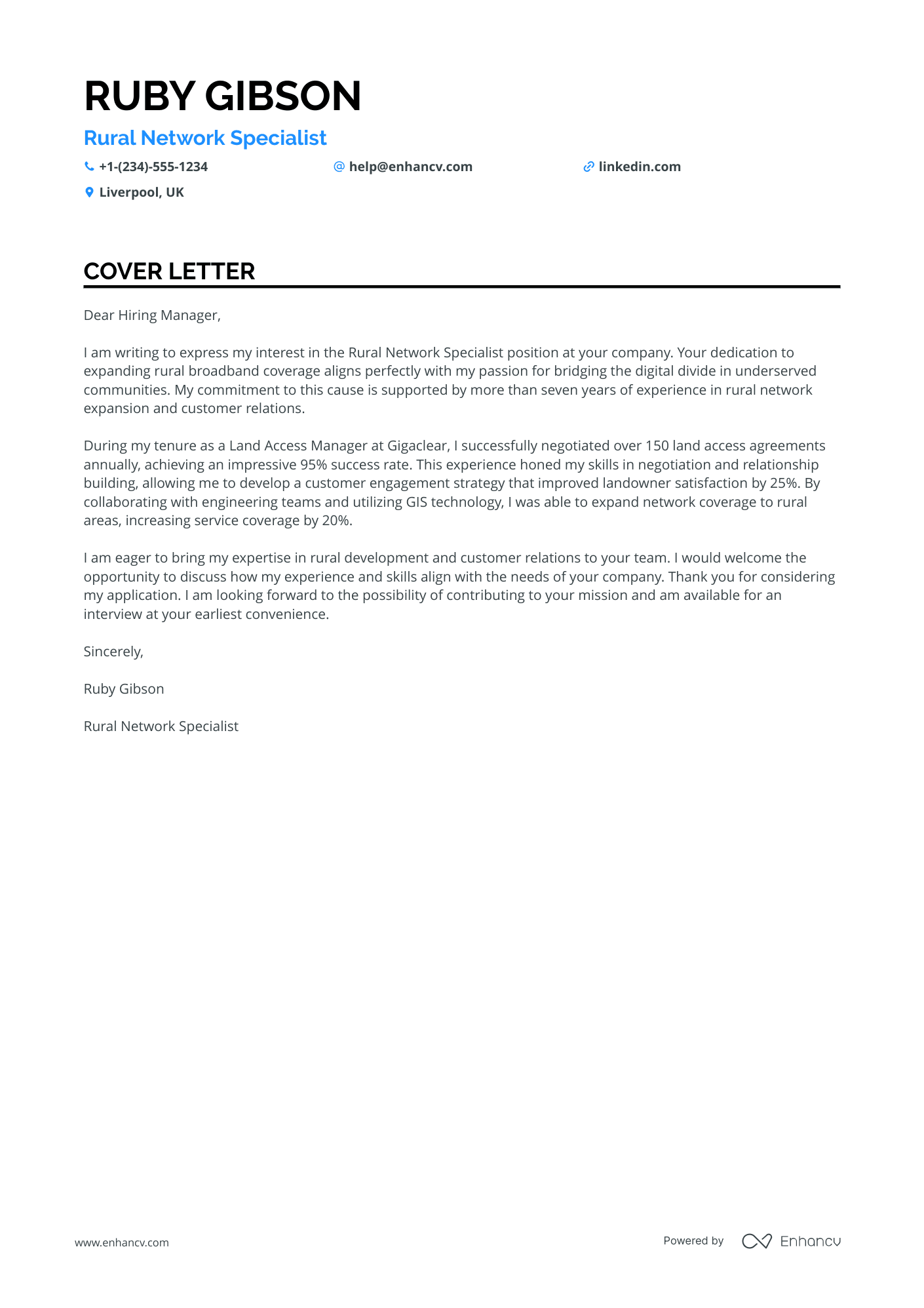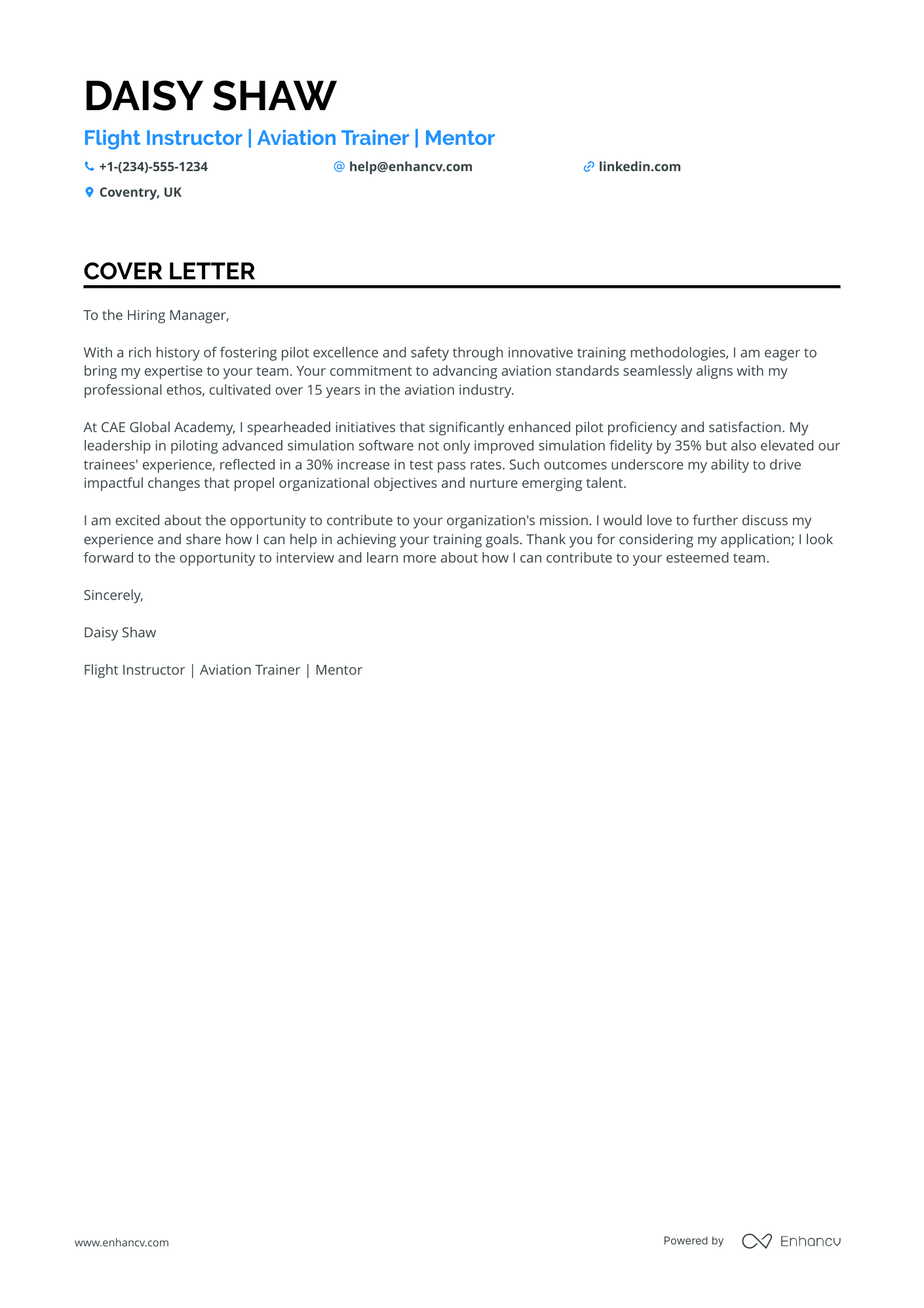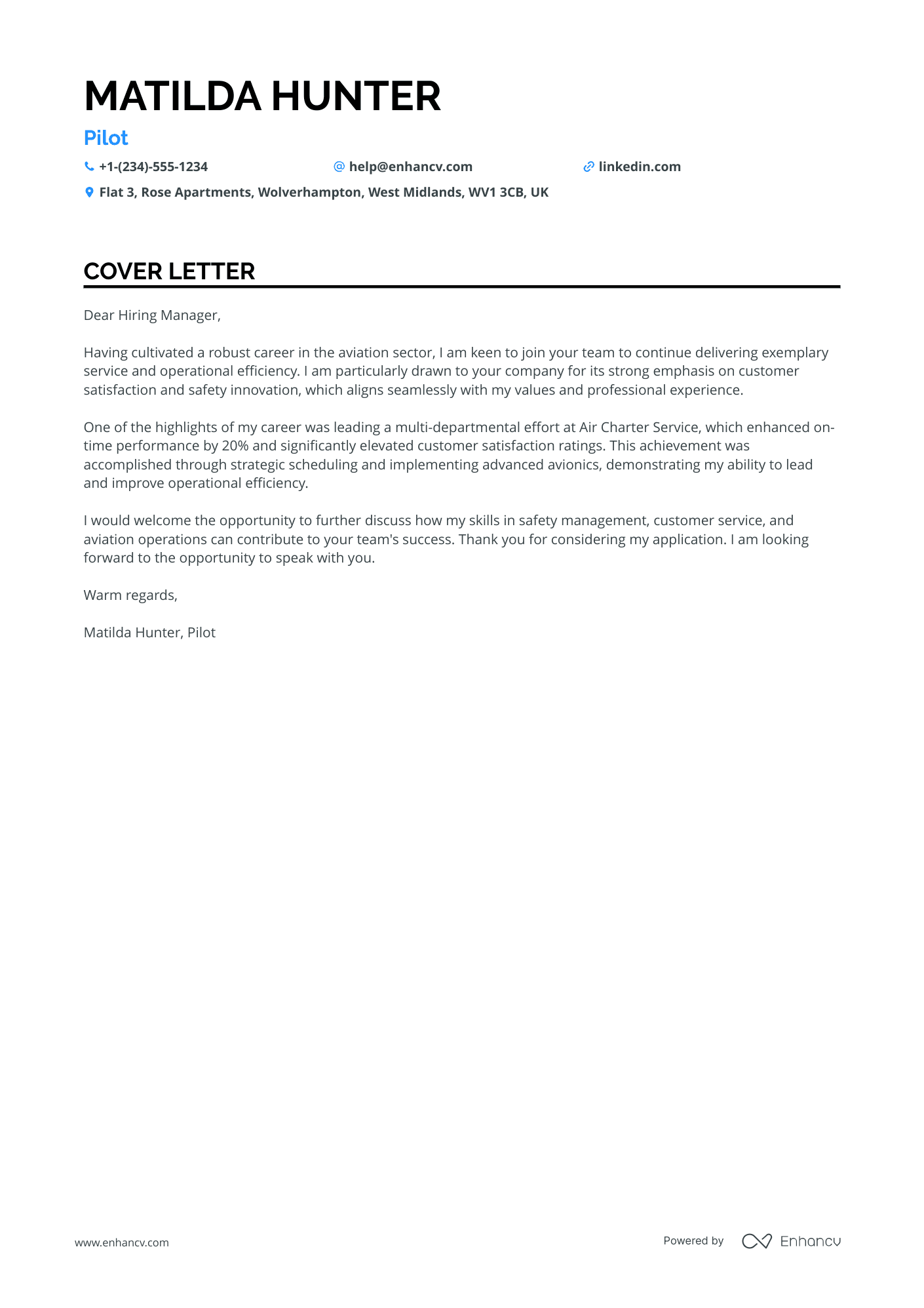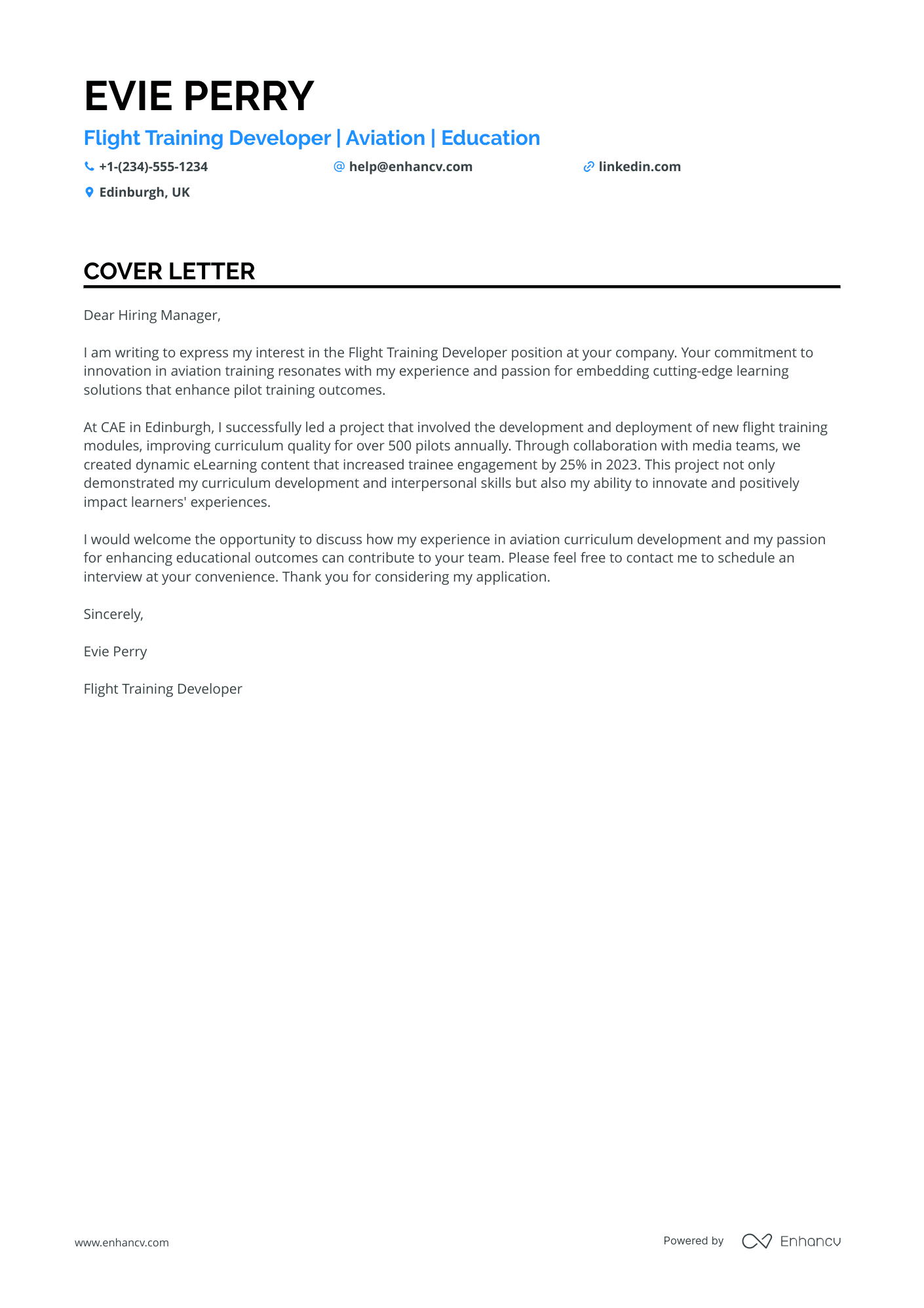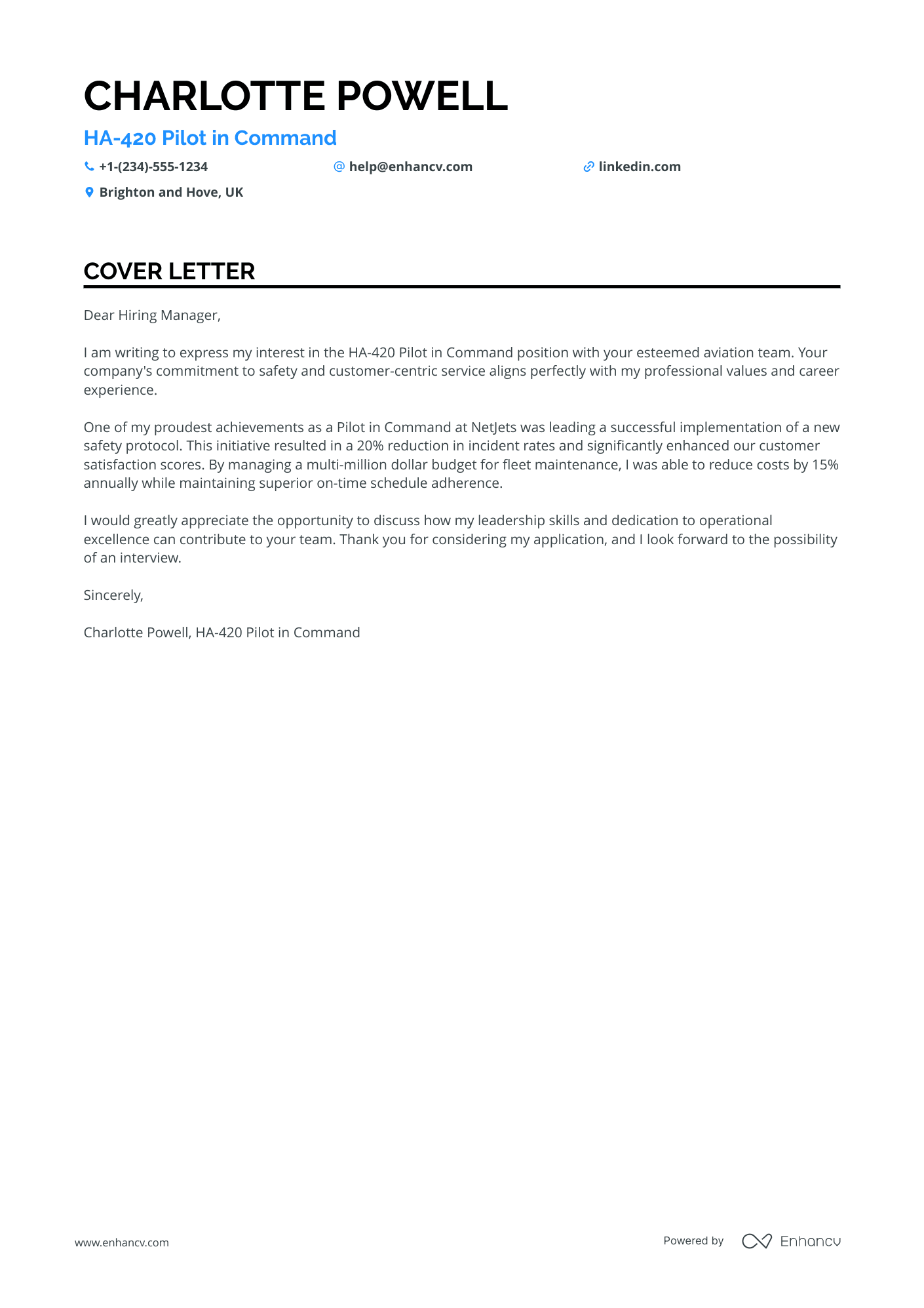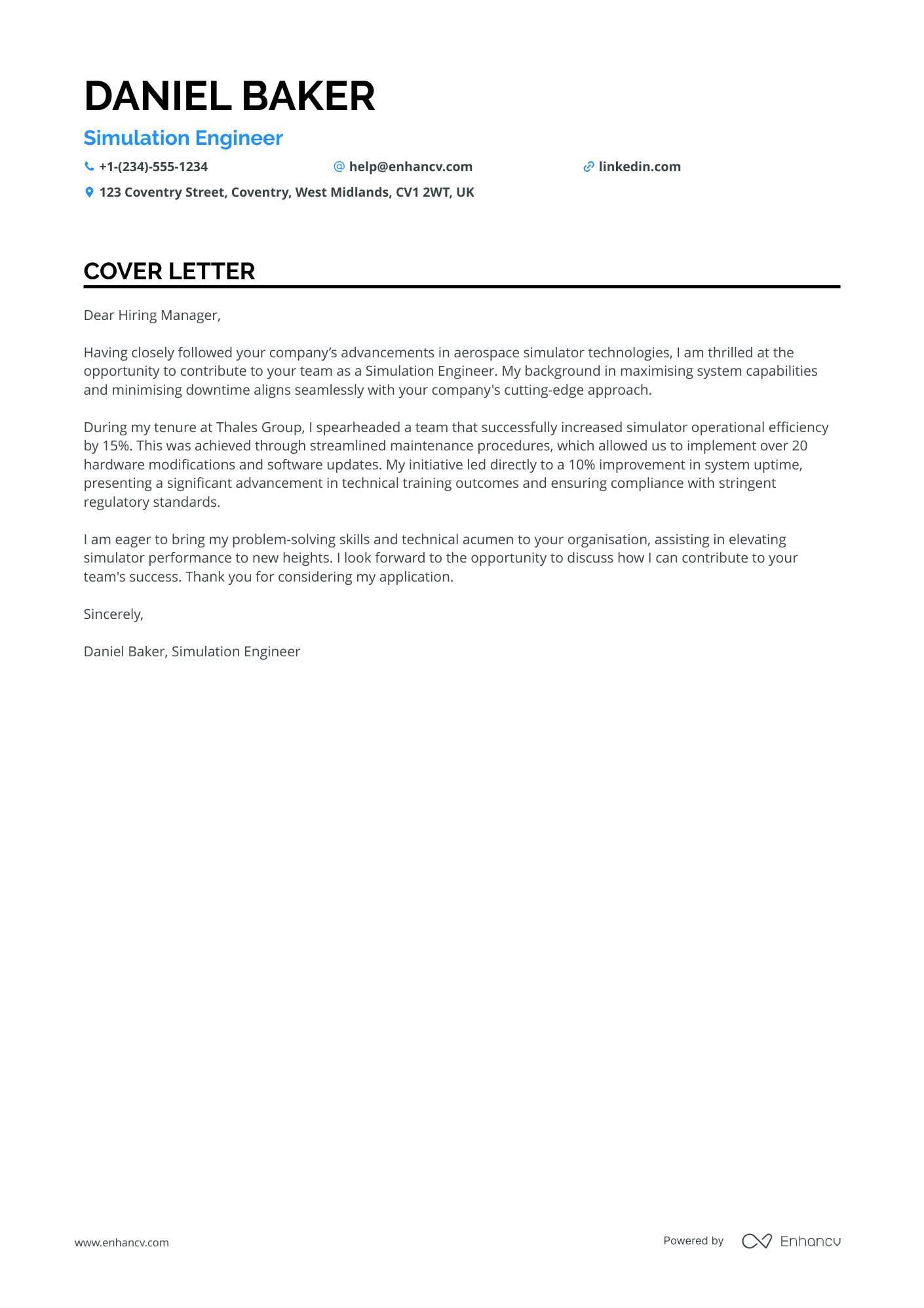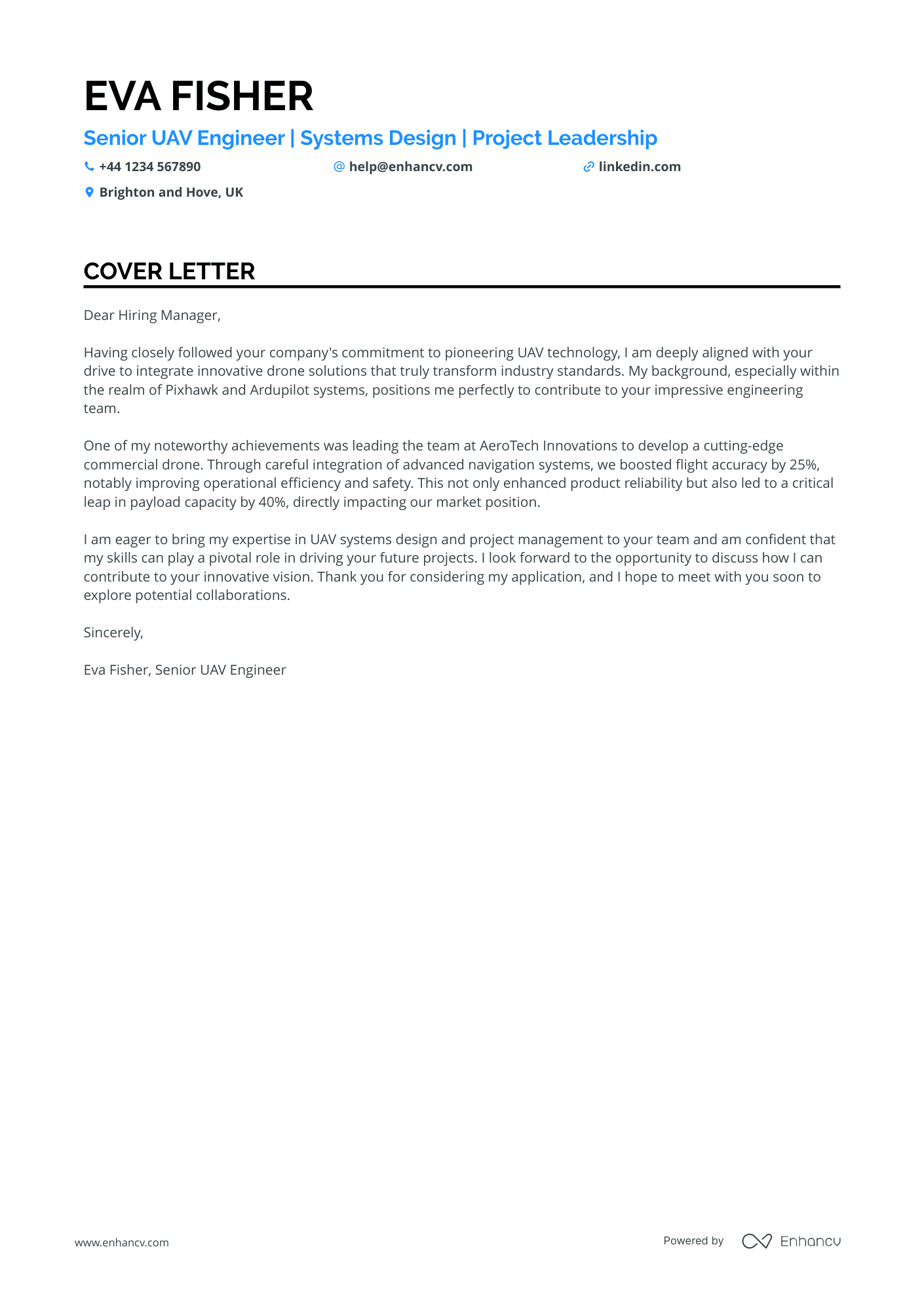You’ve just sent the same cover letter to 60 different job roles, all beginning with “Dear Sir or Madam” and ending with 'Yours sincerely.'
Bad news: you may have just missed your chance to stand out, as generic cover letters are a very common pitfall in job applications.
Did you know recruiters typically shortlist candidates based on how well they meet the job criteria? Failing to address the key requirements can cost you the role.
In this guide, we’ll show you how to tailor your cover letter to align with the job advert or company, ensuring you showcase your value as a candidate.
Cover letter examples for pilot
By Experience
Chief Pilot
- Emphasise Relevant Experience: Highlight achievements such as managing UAV operations and enhancing data collection efficiency, which are directly applicable to the role of a UAV specialist.
- Showcase Leadership Skills: Describe leadership roles and successes in team training and efficiency improvements that demonstrate the ability to lead UAV teams effectively.
- Mention Technical Proficiency: Detail expertise in geospatial data processing and photogrammetry, important skills for roles involving UAV and geospatial technology.
- Highlight Certifications: Include credentials such as the CAA General Visual Line of Sight Certificate, indicating compliance knowledge and commitment to safety standards in UAV operations.
Senior Pilot
- Highlighting specialised certifications such as "Advanced ROV Operations" and "Hydraulic Systems Optimisation" which demonstrate expertise and a commitment to continuous learning in the niche field of ROV piloting and offshore engineering.
- Emphasising leadership and team management skills as shown by leading a team to deploy and operate cutting-edge ROVs effectively and developing a training programme for junior pilots, which are crucial for roles requiring oversight of complex operations.
- Detailing concrete achievements such as operational efficiency improvements and significant cost reductions, which underline the candidate's ability to add value to the employer through innovative problem-solving and resource management.
- Showcasing multi-disciplinary collaboration skills by citing experiences that require working closely with engineering teams to design subsea tooling and enhance cross-functional communication protocols, critical for success in an offshore operations environment.
First Officer Pilot
- Highlighting specific expertise in HEMS operations, which is crucial for a First Officer role in the emergency medical services sector.
- Emphasising strategic improvements in flight operations efficiency and risk management, demonstrating the candidate's ability to enhance operational effectiveness.
- Showcasing key achievements in safety advocacy and communication protocol enhancement, critical components for ensuring safety and quick response in emergency situations.
- Including relevant certifications such as the Advanced Helicopter Emergency Services Training and NVG Certification, illustrating up-to-date training in specialised areas.
Co-Pilot
- Highlighting Relevant Experience: The cover letter effectively showcases Daisy's experience in marine guiding and SCUBA instruction, pertinent to the marine narration and guest services role.
- Specific Achievements: It details quantitative accomplishments like boosting guest satisfaction by 30%, demonstrating tangible results and effective service improvement.
- Relevant Certifications and Education: The mention of a Master of Science in Eco-Tourism and relevant courses indicates specialised knowledge beneficial for a marine narration role.
- Skills and Passion Alignment: Linking marine conservation and underwater photography passions to professional skills showcases a genuine integration of personal interest and professional expertise.
Pilot Instructor
- Highlight Specific Experience: The cover letter adeptly underscores the applicant's 15 years of experience in F-35 instructional operations, which is crucial for a specialised role like Contract Instructor Pilot Lead.
- Showcase Achievements Using Quantifiable Metrics: By listing achievements with specific improvements (e.g., 25% improvement in training efficiency), the cover letter effectively demonstrates the applicant's impact in previous roles.
- Emphasise Relevant Education and Courses: Mentioning degrees in Aerospace and Aeronautical Engineering, as well as specialised courses like "Advanced Civil and Military Flight Instruction," strengthens the candidate's suitability for the role.
- Include Proficiency in Languages and Passion for Technology: Highlighting language skills and a passion for aviation technology supports the candidate’s capability and interest in continuous advancement, valuable traits for leadership in flight training programmes.
Airline Transport Pilot
- Highlight Relevant Experience: This cover letter emphasizes over 10 years of experience in multi-engine aircraft operations, crucial for a P-2012 Captain role.
- Demonstrate Leadership Skills: The candidate effectively showcases leadership by highlighting roles like leading a team of co-pilots and ground staff, directly contributing to improved efficiency.
- Focus on Achievements: It lists specific achievements like improving operational efficiency by 20% and maintaining high customer satisfaction rates, demonstrating the candidate's impact.
- Include Key Skills: Skills such as "Multi-Engine Aircraft Operations" and "Customer Service Excellence" are prominently featured, aligning well with the job's demands.
Private Pilot
- Emphasise specific achievements such as optimising route efficiency for fuel savings and enhancing navigation efficiency, demonstrating leadership in operational improvements.
- Highlight certifications such as Pilot Licence Certified and advanced training courses like Advanced Navigation Systems Training, showcasing specialised skills essential in aviation.
- Mention significant experience in managing cross-continental flights and reduced delay programmes, illustrating expertise in overseeing complex international operations.
- Include examples of excellent leadership and mentorship, such as delivering training to junior pilots and developing training programmes, indicating a commitment to team development and safety.
Commercial Pilot
- Emphasis on extensive flight experience, noting over 1800 hours of multi-engine flight time, which is critical for the role of Pilot in Command.
- Highlighting aviation software proficiency with tools like Jeppesen Direct and Garmin Pilot, which are essential for modern flight operations and safety management.
- Showcasing achievements in operational projects, such as the implementation of safety management solutions that reduced incident reports by 20%, illustrating commitment to safety and operational efficiency.
- Inclusion of advanced educational background in aviation safety and aeronautical engineering, lending credibility to the candidate's expertise in aviation practices and safety standards.
By Role
Helicopter Pilot
- Emphasise relevant industry experience, such as leading teams in the analysis of aircraft performance data and improving fuel efficiency, as this demonstrates your capability to effectively manage and innovate within the aerospace sector.
- Highlight specific achievements like the development of comprehensive flight simulation models or collaborations with the Ministry of Defence, which showcase your direct impact on operational efficiency and readiness.
- Mention advanced educational qualifications and certifications related to aerospace and aviation safety, as these underscore your technical expertise and commitment to professional development.
- Include unique skills like mathematical modelling and data interpretation, which are crucial in the role of an Aerospace Analyst, ensuring you stand out as a candidate with specialised competencies.
Fighter Pilot
- Highlighting Certifications and Security Clearances: The mention of FAA Commercial Pilot certification and Secret Security Clearance immediately indicates relevant qualifications and trustworthiness for high-level operations, which are critical for a fighter pilot role.
- Emphasising Mission Success and Safety Improvements: Discussing a consistent track record of successful mission completion and the implementation of new safety protocols demonstrates both tactical proficiency and a commitment to safety, essential for operational effectiveness.
- Showcasing Training Contributions and Leadership: Describing roles such as squadron leadership and leading adversary pilot training showcases strong leadership and instructional skills, which are crucial for strategic development and mentoring other pilots.
- Professional Development and Education Credentials: Noting advanced degrees in Aerospace Engineering and additional training, such as Advanced Jet Training, underlines ongoing professional development and technical expertise, which adds significant value in the technological aspects of tactical piloting.
Test Pilot
- Emphasise the candidate's extensive experience in electric aircraft development and regulatory compliance, showcasing a solid foundation in specialised industry requirements for an electric aviation test pilot.
- Highlight leadership achievements, such as leading a successful certification programme, which illustrates not only technical proficiency but also project management skills critical for senior positions.
- Include specific examples of cross-functional collaboration and problem-solving, such as resolving regulatory issues and achieving performance improvements, to demonstrate a well-rounded skill set essential for test pilots.
- Draw attention to relevant educational background and additional certifications, such as the Certified Flight Test Engineer course, which affirm a commitment to staying current with industry advancements and methodologies.
Drone Pilot
- Emphasising the FAA Part 107 Certification showcases the necessary regulatory knowledge crucial for a Drone Pilot role.
- Highlighting achievements such as increasing survey accuracy by 30% and achieving 100% safety compliance underscores reliability and expertise.
- Incorporating specific technical skills like Geographic Information Systems (GIS) and aerophotogrammetry affirms specialised proficiency in construction and data analysis.
- Demonstrating leadership by mentioning the development of a drone operations training programme emphasizes the candidate's ability to enhance team performance and safety adherence.
Corporate Jet Pilot
- Highlight Jet Experience: Emphasise extensive experience with jet operations, focusing on achievements like reducing fuel costs by 15% annually, which is highly relevant for commercial piloting roles.
- Safety Management Expertise: Showcase leadership in implementing innovative safety strategies, reducing incidents by 20%, a crucial aspect for demonstrating competence and priority on passenger and operational safety.
- Team Leadership: Detail experience leading teams, such as enhancing flight operations efficiency by 10% and training pilots, demonstrating ability to manage and inspire success in others.
- Aircraft Compliance and Maintenance: Discuss coordination with maintenance teams to cut downtime by 10%, indicating attention to detail and commitment to operational reliability and aircraft safety.
Agricultural Pilot
- Highlighting Certifications: The cover letter effectively showcases relevant certifications such as "Advanced GIS Techniques" and "Effective Negotiation Skills," which underscore the applicant's technical proficiency and negotiation abilities critical for a Rural Network Specialist role.
- Skills Integration: Core skills like GIS, negotiation, and relationship building are integrated into the applicant's narrative, emphasising their direct application in previous roles, thereby demonstrating the candidate's capability to handle the responsibilities associated with rural network expansion.
- Achievements with Impact Metrics: The inclusion of quantifiable achievements, such as a 30% increase in customer satisfaction and a 95% success rate in land access negotiations, provides tangible evidence of the applicant’s success and impact in past projects, which is crucial for such specialised roles.
- Alignment with Passions: The cover letter effectively aligns the applicant’s personal passions, such as rural community development and GIS, with their professional expertise, reinforcing their genuine interest and commitment to the role.
Flight Instructor Pilot
The cover letter effectively highlights key achievements, such as the "Instructor of the Year Award 2019" which underscores both credibility and dedication to training excellence.
Mentoring experience is prominently featured, with specific improvements detailed, like a "15% increase in trainee feedback satisfaction scores," showcasing the candidate's impact on junior instructors and educational quality.
The inclusion of advanced courses from reputable institutions like the "Advanced Instructor Training Course" by Boeing, and "Human Factors in Aviation" by Embry-Riddle Aeronautical University, demonstrates a commitment to continuous professional development and expertise in aviation training.
By emphasizing collaboration and international exposure, evidenced by contributions to "international training workshops," the cover letter highlights an ability to foster global partnerships and contribute to increasing academy revenue.
Air Taxi or Charter Pilot
- Industry Experience: Emphasising 10 years of experience in aviation, showcasing a stable and extensive understanding of the field, which is vital for a Pilot role where safety and experience are paramount.
- On-Time Performance: Highlighting the achievement of increasing on-time performance by 20% demonstrates effective operational efficiency and time management skills crucial to maintaining flight schedules.
- Safety Protocols: Discussing the development and initiation of safety protocols that led to a 15% reduction in incident reports, underscoring the importance placed on safety, a critical factor in aviation.
- Customer Service Focus: Mentioning customer service enthusiasm and achievements, such as improving client feedback scores, aligns with a customer-oriented culture and the importance of passenger satisfaction in aviation.
Ferry Pilot
- Highlight Industry-Specific Certifications: Emphasise specialised certifications such as the IATA Aviation Safety and Risk Management certificate to underline your commitment to safety and industry standards.
- Showcase Relevant Experience: Detail your experience in developing and implementing flight training programmes, especially achievements in enhancing curriculum and pilot competency.
- Emphasise Technological Proficiency: Highlight skills in Adobe Creative Cloud and simulation tools, demonstrating your capability to integrate technology into training for increased engagement and efficiency.
- Mention Impactful Achievements: Use concrete achievements, such as a 25% increase in trainee engagement and improved satisfaction rates, to provide evidence of your effectiveness in the role.
Unmanned Aerial Vehicle Pilot
- Highlighted the Advanced Turbine Engine Technology course, which is highly relevant for a HA-420 Pilot in Command, signalling specialised technical knowledge in turbine engine management and efficiency.
- Mentioned the proficiency in English and French, which can be a valuable asset for enhancing passenger communication and broadening the scope of international operations for a role based in the UK.
- Emphasised significant achievements such as the 98% schedule adherence and the 30% increase in customer satisfaction, which demonstrate success in operational and customer service excellence, pivotal for a Pilot in Command position.
- Included the ATP Certificate and HA-420 Type Rating credentials, key qualifications for a Pilot in Command role, ensuring potential employers are aware of the candidate's authorised capabilities to operate specific aircraft.
Experimental Aircraft Pilot
- The cover letter effectively highlights Daniel's extensive experience in simulator engineering, emphasising his 8 years of specialised expertise in solving complex system problems and achieving significant downtime reduction. This positions him as highly proficient for advanced simulator systems roles.
- Key achievements, such as developing a training programme that reduced error rates by 25%, are clearly mentioned, showcasing Daniel's capability in enhancing team skills and overall operational efficiency which is critical for a senior role.
- Daniel strategically includes his involvement in regulatory compliance through execution of FAA Approval Test Guide evaluations, affirming his dedication to maintaining industry standards and improving system reliability, an essential consideration for an employer operating within regulated sectors.
- The inclusion of passions like 'Aerospace Innovations' and 'Photography' not only humanises him but also aligns directly with his professional field and skill set, implying a genuine interest in ongoing personal and professional development related to simulator performance and precision.
Pilot cover letter example
EVA FISHER
Brighton and Hove, UK
+44 1234 567890
help@enhancv.com
- Emphasize Experience with Specific Systems: Highlight your proficiency with specialized systems such as Pixhawk and Ardupilot, which are pivotal in UAV development and operation, thus showcasing directly applicable skills.
- Quantify Achievements: Include specific metrics and outcomes (e.g., boosting flight accuracy by 25%, increasing payload capacity by 40%) to concretely demonstrate your impact and expertise, making your contributions more tangible.
- Align with Company Values: Show genuine enthusiasm and alignment with the company’s vision, such as pioneering innovative solutions in UAV technology, to demonstrate cultural fit and commitment.
- Highlight Leadership and Technical Expertise: Mention leadership roles and technical achievements that demonstrate a balance of management and hands-on skills, essential for a senior engineering position.
Importance of cover letters in the United Kingdom
A well-crafted cover letter can significantly strengthen your job application by emphasising why you’re an ideal fit.
Here are some reasons why it matters:
- Personalisation: Employers expect your cover letter to demonstrate how your skills and experience align with the company’s needs and/or values.
- Addresses what is omitted from your CV: If your career path includes gaps or changes, your cover letter is the best place to address these positively and explain their relevance.
- Opportunity to stand out: Many applicants have similar qualifications, so a tailored cover letter can show your unique attributes and experience.
What UK employers expect from a cover letter
You only have one chance to impress your potential UK employers, so be wise about writing your cover letter.
When doing so, follow these three simple but essential steps:
- Do your research: Begin by researching the company and the role you're applying for. Check their website, social media pages, and relevant news to understand what drives their business.
- Highlight company values: Identify the company's core beliefs and explain how your personal and professional experiences resonate with them. For instance, if the organisation prioritises innovation, provide examples where you've demonstrated creative thinking.
- Match your skills to the job: Analyse the job description carefully and pick out the most important skills or qualifications they’re seeking. Be sure to mention your relevant achievements that prove you're the perfect fit for the position.
How to format a pilot cover letter
To get your cover letter's formatting right:
- Use a modern font like Lato, Raleway, or Chivo, rather than the overused Arial or Times New Roman.
- Set your cover letter to be single-spaced with 1-inch (2.5 cm) margins on all sides—our templates are automatically set up for you.
- Ensure both your CV and cover letter are consistent in font style and formatting.
- Always send your cover letter as a PDF to prevent alterations and preserve its layout.
When it comes to structuring your cover letter, follow this sequence: begin with your address and contact details, then the employer's details (i.e. name and address), and the date. Next, start with a personalised greeting, followed by your introductory, body, and closing paragraphs. Be sure to include a sign-off and your signature at the end.
Remember, although Applicant Tracking Systems (ATS) software, which may scan your CV for keywords, won't read your cover letter, it will be reviewed by recruiters.
How to write your pilot cover letter salutation
First impressions often start with the greeting and in the case of your job application, 'Dear Sir or Madam' simply won't suffice.
Find out who’s hiring for the role—by calling or emailing the company, searching online, or using LinkedIn—and address them correctly.
Generally, you should address them by their surname (e.g., 'Dear Mrs Weasley'), but if you've spoken to them before, you might use their first name (e.g., 'Dear Albus').
How to write your pilot cover letter intro
Employers do want someone who not only delivers results but does so with enthusiasm.
Thus, a great way to start your cover letter is by showing how your personal passions align with the role.
Highlight one or two aspects of the job description that resonate with you, and explain why this makes you a perfect fit for the company and its culture.
How to write your pilot cover letter body
You’ve personalised your greeting and introduction—now it’s time to focus on writing the body of your cover letter.
Instead of listing off skills and responsibilities from your CV, focus on one career highlight that’s relevant to the role.
Use your hard and soft skills, success metrics (e.g., percentages or sales figures), and the long-term impact it had on the company.
A concise, well-told story centred on your value as a candidate will make a strong impression.
How to write a closing paragraph
There’s a wrong and a right way to close your cover letter. Here’s how.
The wrong way is to end with a signature or a formal 'Thank you in advance.'
The right way is to either promise how you’d make a positive impact on the company or ask when you can expect a response. This will highlight you as a forward-thinking candidate who’s enthusiastic about securing the role.
Conclusion
Your cover letter is an opportunity to showcase your personality and skills to potential employers. Start by addressing the hiring manager by name and tailoring your content to reflect the role’s requirements.
Include a specific example of your greatest achievement to illustrate your suitability for the position, while also expressing your enthusiasm for the company. Remember to format your letter professionally, ensuring it aligns seamlessly with your CV.
